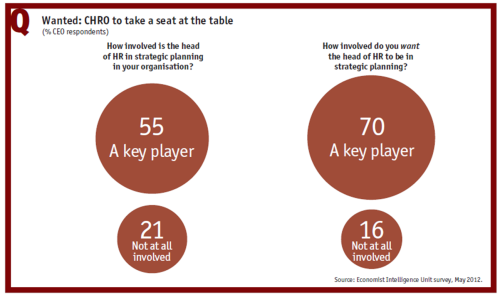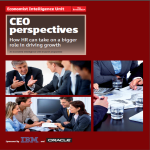The report of a global CEO survey by The Economist Intelligence Unit, and sponsored by IBM and Oracle (an interesting pairing), just crossed my desk.
The report — CEO perspectives: How HR can take a on a bigger role in driving growth — is not very encouraging. Either CEOs are talking out of both sides of their mouths (HR’s choice, I’m sure) or global Chief HR Officers are in bigger trouble than we thought.
The survey, conducted in May 2012, included 235 C-level executives, 134 of whom are CEOs. A total of 38 countries were represented from North America (47 percent), Western Europe (40 percent), Eastern Europe (8 percent) and the Middle East (4 percent). A range of industries were included and half of the companies had $500 million or more in annual revenues. Additionally, six (6) in-depth interviews were conducted with four (4) CEOs and two respected academics.
Does HR need to develop a “therapeutic” CEO relationship?
While the Economist Intelligence Unit authors tried to spin the results in a positive way, there’s just no getting around the conclusion that even big company CHROs are having a hard time getting access to the strategic business discussions at the top of their organizations.
While 76 percent of the surveyed CEOs say their relationship with the head of HR is close and trustful, only 55 percent report that the head of HR is a key player in strategic planning.
 What I found really interesting was the perception by the authors that the way to greater inclusion in strategic decision making is to become “a confidante and informal executive coach” to the CEO. It said, “If the CEO has repeatedly relied on the head of HR for certain important matters, and they still see eye to eye, he or she is more likely to invite the HR head to participate in other areas as a matter of course.”
What I found really interesting was the perception by the authors that the way to greater inclusion in strategic decision making is to become “a confidante and informal executive coach” to the CEO. It said, “If the CEO has repeatedly relied on the head of HR for certain important matters, and they still see eye to eye, he or she is more likely to invite the HR head to participate in other areas as a matter of course.”
So, developing a personal, “therapeutic” relationship with the CEO is the first best practice the report’s authors recommend. But you’re doomed, I guess, if you don’t see eye to eye.
Some interesting (but depressing) data
Becoming liked and trusted by the CEO is the way forward to weighing in on strategic business decisions. This, despite the finding that 50 percent of the surveyed CEOs spend five (5) hours or less a month – in either one-on-one or group settings – with their head of HR. I wonder how you figure out if you even see eye-to-eye in less than five hours a month.
The report has lots of interesting – and depressing – data, and you should probably take a look. But I think this gets filed under: Duh!
The Economist Intelligence Unit’s bottom line appears to be that CHROs whose CEOs like them get more involvement in the business. I hope IBM and Oracle didn’t spend big bucks on this research.
This originally appeared on China Gorman’s blog at ChinaGorman.com.
